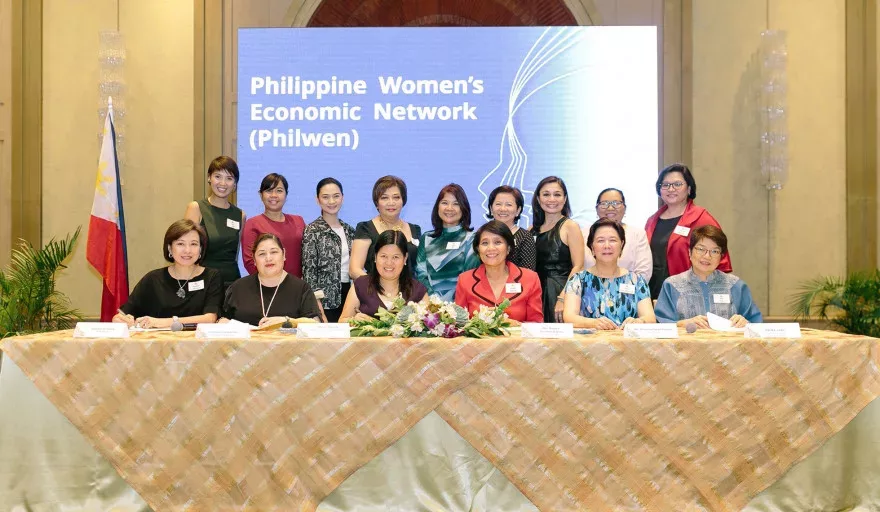As a favourable business environment and hotbed for female entrepreneurship, the Philippine Women’s Economic Network (PhilWEN) is pioneering an equitable future for Filipino women.
ECONOMIC EMPOWEREMENT FOR FILIPINO ENTREPRENEURS
Did you know that the Philippines is one of the most gender-equal countries in the world? In the 2021 Global Gender Gap Report published by the World Economic Forum, the country ranked 17th globally, and second in the Asia Pacific region. The Philippines upholds its commitments to the UN Sustainable Development Goals (SDGs) for 2030, a key pillar of which is ‘SDG #5’ – to achieve gender equality and empower all women and girls on the understanding that economic empowerment of women is fundamental to sustainable development.
At the forefront of realising this vision in the Philippines is the Philippine Women’s Economic Network (PhilWEN). Working to eliminate gender inequality and bias as factors that undermine economic growth, and instead advocating equal opportunities for education, paid employment and greater decision-making power in both public and private sectors, we find out more with Founding Chairperson and President, Ma. Aurora D. Geotina-Garcia.
QANDA WITH PHILWEN
Firstly, could you introduce us to PhilWEN and tell us about your mission?
Ma. Aurora D. Geotina-Garcia, Founding Chairperson and President (ADG): PhilWEN is a coalition of women’s business organisations with a broad representation of female participation in the economy. The member organisations are comprised of women entrepreneurs: Micro, small and medium-sized enterprises (MSMEs), large enterprises, start-ups, marginalised women, and professionals – middle managers, CEOs, and board directors. PhilWEN advocates for women’s economic empowerment through initiatives that encompass a wide age and socio-economic reach.
PhilWEN’s vision is to be the catalyst that will integrate and harness the strengths of coalition members into an influential force for women’s economic empowerment and gender equality. Our mission is to empower and uplift women to become equal partners in society, by equipping them with the tools to provide a better future for themselves and their families, and have the hope, opportunity, and ability to control their lives and to enable all Filipino women to be viewed and treated equally in all aspects of life. We enable women to be self-sustaining and well-recognised in their community, to be well respected and truly empowered, and to be advocates for women’s rights, capacities and driving forces for social change.
“Women in the Philippines are making astounding progress as business leaders and entrepreneurs – we are known to have significantly closed the gender gap in areas such as health and education”
Ma. Aurora D. Geotina-Garcia, Founding Chairperson and President, PhilWEN
What do PhilWEN identify as the key drivers of change for workplace gender equality?
ADG: In 2017, PhilWEN partnered with Investing in Women, an initiative of the Australian Government, to form the Philippine Business Coalition for Women Empowerment (PBCWE). PBCWE, as the inaugural project of PhilWEN, leads the business sector’s efforts to institutionalise gender equality in the workplace and pursue women’s economic empowerment nationwide, with 27 member companies as of May 2022. PBCWE member companies have adopted initiatives that are quantifiable, factual, and evidence-based which gives them a competitive edge in terms of attracting and sustaining the best talent in the market.
In PBCWE, we believe that leadership commitment or “setting the tone from the top” is the most important driver of change. Leaders should proactively promote workplace gender equality (WGE) through proactive and responsive policies and programmes within and outside the organisation to accelerate business sustainability, efficiency, and innovation.
Furthermore, more work should be done to put value in the human aspect of work, recognising that soft skills are of equal importance to technical skills and that the workplace extends to other spheres of life. Innovative business practices such as flexible work should be advanced, and at the same time, company policies and directions should be based on comparable data. Regular and consistent gender-disaggregated data reporting is the best way to accurately measure trends as it provides a clear picture of the state of WGE and allows companies to gauge the gaps and challenges that need to be addressed. We support the theory that “what gets measured gets acted upon.”
Would you say the Philippines is becoming an enabling environment for female entrepreneurs?
ADG: Yes, definitely. Although we are a developing country that is always calamity-stricken throughout the year, especially with the COVID-19 pandemic to deal with, people have become resilient, especially the women. During these challenging times, it is women who have stepped up to juggle every single role they possibly can to manage their household, job, business, or family.
In the Philippines, we are big on e-commerce and major local platforms have programmes encouraging female entrepreneurs to introduce and grow their businesses. Banking institutions also have initiatives that support women entrepreneurs and one specific example of this is the Development Bank of the Philippines (DBP) programme, called “ILAW” – which translates as “Light”. ILAW, an abbreviation for Inclusive Lending for Aspiring Women, simplifies lending procedures and requirements for micro and small businesses, has a flexible collateral policy, customised payment terms that match the cash flow of the business, and borrowers can benefit from consultation sessions with seasoned women entrepreneurs from the Women’s Business Council Philippines.
There are also other programmes that support female entrepreneurs ranging from training, learning sessions, mentoring programmes, and workshops. Social media plays a major role in promoting these programmes as the main media channel that the majority of women-led MSMEs can access.



































